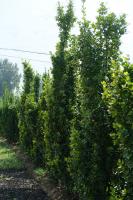Where in Yard to Plant Citrus Trees
Adding citrus trees to your yard can be a great way to add beauty and delicious fruits to your landscape. When it comes to planting citrus trees, there are a few things you need to keep in mind, such as the climate, soil quality, and space requirements. In this article, we will discuss where in your yard you should plant citrus trees to ensure they thrive and produce the best fruits.
1. Climate
Citrus trees are typically grown in warm, sunny climates and need a moderate amount of water. They can do well in USDA zones 9 to 11, where temperatures range from 20°F to 50°F. It's important to ensure your yard's climate can support the growth of citrus trees, or they may struggle or fail to produce fruits.
2. Soil Quality
Citrus trees prefer well-draining soil that's rich in nutrients. Soil with high clay content or poor drainage can cause waterlogging, leading to root rot, and other problems. Before planting citrus trees, check the soil pH level, and aim for a range between 6.0 and 7.0. You can amend the soil by adding organic matter, such as compost, to improve its quality.
3. Sunlight Requirements
Citrus trees require full sunlight to grow and produce fruits. Ideally, they need at least 6 to 8 hours of direct sunlight daily. Therefore, it's essential to choose an area in your yard that receives enough sunlight throughout the day. This can be a challenge if you have large trees or tall buildings that block the sun, so consider the location carefully.
4. Space Requirements
Citrus trees can grow up to 25 feet in height and width, so it's essential to plant them in an area that provides enough space for growth. Keep in mind that mature trees can produce a lot of fruits, so they need adequate space to avoid overcrowding branches, which can lead to diseases and pests.
5. Protection from Frost and Cold
Most citrus trees are vulnerable to frost and cold temperatures, which can damage leaves, roots, or fruits. To protect them from cold weather, it's essential to plant them in an area that's sheltered from strong winds and frost pockets. You can also cover the trees with blankets or tarps during cold snaps or invest in frost cloth that covers the tree like a hoodie.
Conclusion
In conclusion, planting citrus trees can be a fun and rewarding experience, but it's crucial to choose the right location in your yard. Make sure you consider the climate, soil quality, sunlight requirements, space requirements, and protection from frost and cold temperatures. With proper care and attention, your citrus trees can flourish, and you can enjoy their sweet, juicy fruits for years to come.

 how many times do yo...
how many times do yo... how many planted tre...
how many planted tre... how many pine trees ...
how many pine trees ... how many pecan trees...
how many pecan trees... how many plants comp...
how many plants comp... how many plants can ...
how many plants can ... how many plants and ...
how many plants and ... how many pepper plan...
how many pepper plan...































